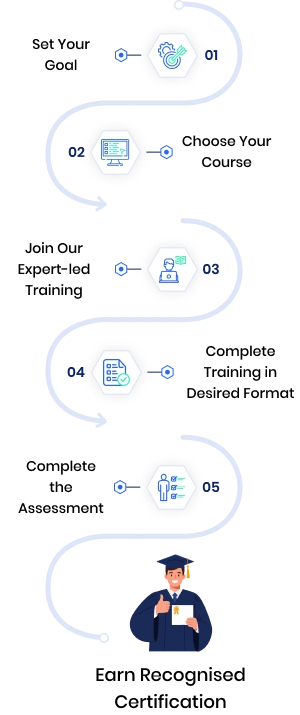Course Overview O v e r v i e w
- Course Overview
- Course Outline
- What’s Included
- What You’ll Learn
- Exam Details
ISTQB Software Testing Foundation Overview
The ISTQB Software Testing Foundation Course provides essential knowledge of testing methods, terminology, and techniques used in professional software testing environments. It focuses on enabling participants to design effective test cases, identify defects, and understand quality assurance best practices.
This course offers a structured pathway for anyone beginning their journey in software testing or seeking to enhance their practical understanding of testing processes. It helps participants gain the necessary skills to contribute effectively to software quality improvement initiatives.
At Training Deals, we deliver ISTQB Software Testing Foundation training designed for both beginners and professionals. Our trainers combine theoretical knowledge with hands-on exercises and real-world case studies, ensuring that learners develop the confidence to perform testing tasks with precision and efficiency.

ISTQB Software Testing Foundation Outline
Domain 1: Fundamentals of Testing
Module 1: What is Testing?
What is Testing?
Testing and Debugging
Module 2: Why is Testing Necessary?
Why is Testing Necessary?
Testing’s Contributions to Success
Testing and Quality Assurance (QA)
Errors, Defects, Failures, and Root Causes
Module 3: Testing Principles
Testing Principles
Module 4: Test Activities, Testware and Test Roles
Test Activities and Tasks
Test Process in Context
Testware
Traceability Between the Test Basis and Test Work Products
Testing Roles
Module 5: Essential Skills and Good Practices in Testing
Generic Skills Required for Testing
Whole Team Approach
Advantages of the Whole Team Approach
Independence of Testing
Levels of Independence
Domain 2: Testing Throughout the Software Development Lifecycle
Module 1: Testing in the Context of a Software Development Lifecycle
Software Development and Software Testing
Software Development Life Cycle Models
Impact of the Software Development Lifecycle on Testing
Software Development Lifecycle and Good Testing Practices
Software Development Models
Testing as a Driver for Software Development
DevOps and Testing
Shift Left Approach
Retrospectives and Process Improvement
Module 2: Test Levels and Test Types
Test Levels
Component Testing
Integration Testing
System Testing
System Integration Testing (SIT)
Acceptance Testing
Test Types
Confirmation Testing and Regression Testing
Module 3: Maintenance Testing
Maintenance Testing
Domain 3: Static Testing
Module 1: Static Testing Basics
Static Testing Basics
Work Products Examinable by Static Testing
Value of Static Testing
Differences between Static Testing and Dynamic Testing
Module 2: Feedback and Review Process
Feedback and Review Process
Review Process Activities
Roles and Responsibilities in Reviews
Review Types
Success Factors for Reviews
Domain 4: Test Analysis and Design
Module 1: Test Techniques Overview
Test Techniques Overview
Module 2: Black-box Test Techniques
Equivalence Partitioning
Exercise
Boundary Value Analysis
Exercise
Decision Table Testing
Exercise
State Transition Testing
Exercise
Module 3: White-box Test Techniques
White-box Test Techniques
Statement Testing and Statement Coverage
Branch Testing and Branch Coverage
The Value of White-box Testing
Module 4: Experience-based Test Techniques
Error Guessing
Exploratory Testing
Checklist-Based Testing
Module 5: Collaboration-based Test Approaches
Collaboration-based Test Approaches
Example 1: E-Commerce Website Checkout Feature
Example 2: Hospital Management Software
Exercise
Collaboration-based Test Approaches
Domain 5: Managing the Test Activities
Module 1: Test Planning
Purpose and Content of a Test Plan
Tester's Contribution to Iteration and Release Planning
Entry Criteria and Exit Criteria
Estimation Techniques
Example
Test Case Prioritisation
Example: Risk-Based Prioritisation
Test Case Prioritisation
Example: Test Case Prioritisation
Test Case Prioritisation
Example: Requirements-Based Prioritisation
Exercise
Test Pyramid
Testing Quadrants
Module 2: Risk Management
Risk Definition
Risk Attributes
Project and Product Risks
Project Risks
Product Risk Analysis
Product Risk Analysis: Risk Identification
Risk Control
Risk Control – Risk Mitigation
Risk Control – Risk Mitigation (Example)
Risk Control – Risk Monitoring
Risk Control – Risk Monitoring (Example)
Module 3: Test Monitoring, Test Control and Test Completion
Test Monitoring
Test Reporting
Communicating the Status of Testing
Module 4: Configuration Management
Configuration Management
Module 5: Defect Management
Defect Management
Exercise
Domain 6: Test Tools
Module 1: Tool Support for Testing
The Meaning and Purpose of Tool Support
Tool Support for Testing
Module 2: Benefits and Risks of Test Automation
Benefits and Risks of Test Automation

What’s included in this ISTQB Software Testing Foundation?
- Expert-led Training Sessions by Certified Instructors
- ISTQB Software Testing Foundation Level Exam
- Digital Delegate Pack
What You’ll Learn in this Course
This course equips learners with the foundational skills required to plan, design, and execute software tests effectively. Each outcome supports a deeper understanding of structured testing practices.
Learn the fundamental concepts, principles, and objectives of software testing
Learn the relationship between testing and software development lifecycle models
Learn to design, document, and prioritise effective test cases
Learn to identify, analyse, and report software defects efficiently
Learn about various testing levels, techniques, and tools used in the industry
Learn to apply structured testing processes to enhance software quality

ISTQB Software Testing Foundation Exam Information
The ISTQB Software Testing Foundation Level Exam assesses a candidate’s understanding of software testing principles and practices as defined in the syllabus. The exam format is:
Question Type: Multiple Choice
Total Questions: 40
Total Marks: 40 Marks
Pass Mark: 65%, or 26/40 Marks
Duration: 60 Minutes
Type: Closed Book

Our Upcoming Batches
No schedules available.
No data available
No schedules available.
Request More Information

Corporate Training
Elevate your workforce with expert-led corporate training that enhances skills, boosts productivity, and aligns teams with your business goals.

Individuals Training
Unlock personal growth and sharpen professional skills with tailored training designed to build your confidence and career success.
Your Path to Professional Recognition
Our path is designed to guide you through each stage with clarity, support and practical learning, helping you achieve your goals with confidence.

Step Forward with Globally Recognised Certification
A recognised certification is more than a credential. It’s proof of your commitment to professional excellence, providing you with the credibility, confidence, and global reach to advance your career in exciting new directions.
Globally Certified Professionals Over Time
Career Growth
81%Certified professionals reported receiving a promotion after earning their certification.
Global Opportunities
89%Certified professionals experienced access to new career opportunities, including leadership roles and global positions.
Not able to find what you are looking for
Our experts will guide you to the right course from thousands worldwide: tailored to your goals.
Frequently Asked Questions
It is an entry-level certification course that validates fundamental knowledge of software testing principles, methods, and terminology.
It provides a globally recognised qualification that enhances career opportunities and demonstrates a strong understanding of testing fundamentals.
This course is ideal for Software Testers, QA Engineers, Developers, and anyone interested in pursuing a career in software testing.
Yes, software testing principles are applicable across IT, finance, healthcare, telecommunications, and many other sectors.
It strengthens testing skills, ensures process efficiency, and contributes to the delivery of high-quality software.
What Our Customers Say About Us
 Matthew Sullivan
HR Business Partner
Matthew Sullivan
HR Business Partner
Our HR team registered for the Change Management Foundation & Practitioner Training Course, and it couldn’t have been more valuable. The team gained practical frameworks to guide employees smoothly through transitions with confidence.
 Olivia Barrett
Operations Manager
Olivia Barrett
Operations Manager
Our operations staff completed the Lean Six Sigma Green Belt Training Course, and it has been transformative. We can now identify inefficiencies quickly, and the tools we learned are already improving performance across the team.
 Benjamin Foster
Product Manager
Benjamin Foster
Product Manager
Our product team took part in the Agile Project Management Foundation & Practitioner (AgilePM®) Training Course, and the difference is remarkable. We’re now more adaptive, collaborative, and efficient in managing change.
 Lucy Harper
IT Support Lead
Lucy Harper
IT Support Lead
Our IT support unit attended the ITIL® 4 Foundation Training Course, and the results have been impressive. Processes are smoother, collaboration has improved, and the team finally speaks a common language of service management.
 Edward Clarke
Programme Manager
Edward Clarke
Programme Manager
We joined the PMP® Certification Training Course as a leadership group, and it was outstanding. The trainer made every concept practical, and the exam preparation resources helped the whole team feel ready to tackle complex projects.
 Amelia Rhodes
Project Officer
Amelia Rhodes
Project Officer
Our project office completed the PRINCE2® Foundation & Practitioner Training Course, and it has brought real clarity to how we manage projects. The trainer’s examples were excellent, and the team now follows a structured approach with confidence.

























